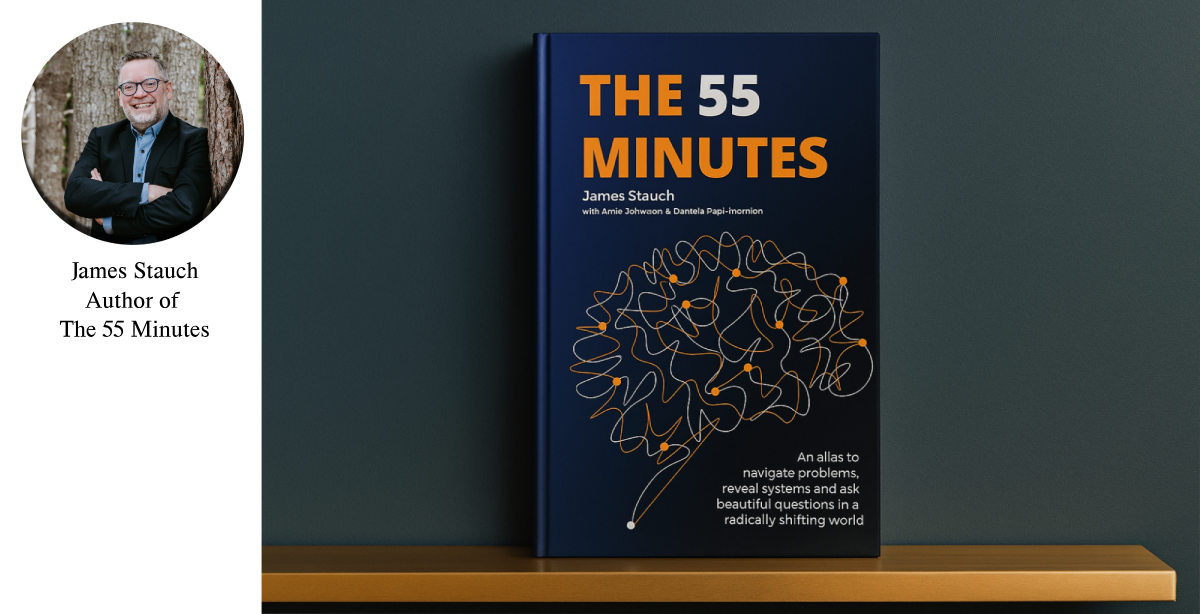
Date: July 25, 1-2:00 PM ET (Zoom Webinar)
Cost: Free
*All registrants will be provided with a link to the recording and presentation slides following the session. The recording will be available for 60 days.
Albert Einstein is credited with saying, “If I had an hour to solve a problem, I’d spend fifty-five minutes thinking about the problem and five minutes thinking about solutions.” Join this webinar to hear from James Stauch, lead author of The 55 Minutes, about how to use those metaphorical first fifty-five minutes wisely. If we want to be successful when we innovate, act, or try to “change the system,” we need to get serious about understanding the problem. Unfortunately, the world that most of us inhabit is focused on those last five minutes—rushing headlong toward a “solution” without having understood the problem. But the kinds of problems we face in our workplaces, institutions, and society at large are the results of systems. For those who lament that “the system is broken,” “the system is rigged,” or “it’s a systemic problem,” this is a guide to understanding those systems and hopefully feeling less helpless, alienated, and confused. But the world is not linear, binary, or static. As those who are ecologically-oriented know, the world is rich with complex systems, and it is changing rapidly and radically. But in order to keep up, we need to slow down and think.
This webinar will focus on this under-developed area of "problem understanding," providing an overview of how to use your "55 minutes" wisely. It will cover a range of key questions, frameworks, concepts, and dive into a couple of the 30 tools outlined in the book to help you spend more time identifying, framing, observing, and listening to the system(s) that created and sustain a conservation or other environmental challenge you are working to address. The webinar will help environmental activists, organizations, funders, and policy makers spend less time "solving the wrong problem precisely" and more time navigating the complexity of the challenge and asking more beautiful questions that may point to new directions, alternatives, and possible places to leverage change.
Order your hard copy, or download a free PDF of the book, at https://the55minutes.com

.jpg)
James Stauch has authored many guides, scans, and trend analyses on a range of contemporary social issues. A social innovation and systems change educator and consultant based in Bridgewater, Nova Scotia, he serves as Co-chair of the Banff Systems Summit and as Complex Systems Strategist with ATCO’s SpaceLab. James is also a Visiting Fellow at the Skoll Centre at the Saïd Business School, University of Oxford, and was the founding Executive Director of the Institute for Community Prosperity at Mount Royal University. He is also the former chair of Environment Funders Canada and currently serves on the board of Ecotrust Alberta Foundation.

Session 1: Settler Colonialism 101
Introduce ENGO representatives to the fact that colonization is a structure and not an event. Identifies key ways that colonialism moves through individuals and organizations.
Session 2: Positionality
ENGO representatives learn how to articulate their social location within a settler colonial state, and in relation to potential Indigenous partners.
Session 3: Inherent Indigenous Governance 101
Introduce the fact that Indigenous nations have their own sources of political authority that they can (and do) draw on when addressing environmental issues. Examples provided.
Session 4: Building Better Relations
ENGO representatives will road test ways they can implement previous workshop key points to re-imagine partnerships with Indigenous nations.
Cost: $100 (or register 4 staff from the same organization for one stream and get the 5th registration free)
All registrants will be provided with a link to access the recordings and presentation slides for 60 days following each session.

Session 1: Diagnosing Settler Colonialism in the Enviro Sector
Participants will be asked to share ways in which they have diagnosed and traced power in social justice movements and/or in the ENGO sector. This workshop will make space for discomfort as part of promoting decolonization.
Session 2: Inherent Indigenous Governance
A mix of advanced and introductory theory, this workshop delves into legal and political pluralism, naming the fact that Indigenous nations have their own sources of political authority that they can (and do) draw on when addressing environmental issues.
Session 3: The Nonprofit Industrial Complex
ENGO participants are introduced to theories and examples describing the Nonprofit Industrial Complex and the “Shadow State.” Purpose is to show how settler colonialism structures civil society.
Session 4: Decolonizing ENGO-First Nation Partnerships
This workshop delves deep into how ENGOs can partner with Indigenous nations beyond the Nonprofit Industrial Complex while promoting deference to inherent Indigenous political leaders.
Cost: $100 (or register 4 staff from the same organization for one stream and get the 5th registration free)
All registrants will be provided with a link to access the recordings and presentation slides for 60 days following each session.

The Indigenous only space will be collaborative in nature but critical in approach. This track is a space for Indigenous folks within the ENGO sector to come together to discuss their experiences and work, with an eye to taking a position on what the sector might need to do in order to promote decolonization. Participants will use the first session to define our goals for the remaining three meetings. Therefore, session topics named here are proposals only.
Session 1: Naming the Cannibal: Settler Colonialism in the ENGO Sector
Session 2: Proposed topic: Reflections on working in the ENGO Sector
Session 3: Proposed topic: Centering Indigenous Thought in the ENGO Sector
Session 4: Proposed topic: Visioning a Decolonial Environmental Sector
Cost: Free
